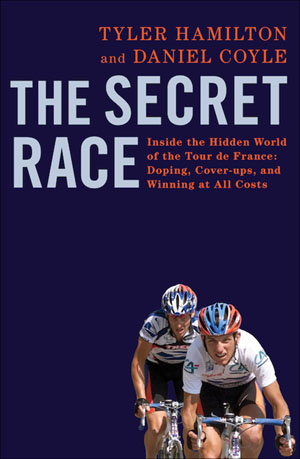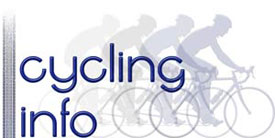In 2003, Tyler Hamilton, a former teammate of Lance Armstrong, finished 4th in the Tour de France – despite having a broken collarbone. It was one of the most gutsy rides in the history of the sport. He was widely regarded as a nice guy, a great athlete with a supreme capacity to endure pain. In 2004, his career reached a pinnacle winning the gold medal in the Olympic time trial. But, he later tested positive for a drugs test and was banned from the sport. Despite overwhelming evidence he protested his innocence. But, despite his denials, he was never able to regain his position in the sport. It was not until 2010, that he fully confessed to his career long use of performance enhancing drugs and the lies he used to cover his tracks.
This book, written with Dan Coyle is Tyler’s story. – The Secret Race, Tyler Hamilton and Daniel Coyle

In August 2012, Lance Armstrong refused to contest the decision of USADA that he had systematically doped throughout his career. As a result the USADA handed a lifetime ban and stripped him of his Tour titles. That decision re-awakened in me a long dormant interest / obsession about doping in the peleton.
I wrote a few articles about doping, but soon got fed up. It was all too depressing, and all too easy to get worked up into self-righteous indignation at the extent of doping in the sport. I kind of made a decision to leave doping alone. But, seeing Tyler Hamilton’s Book come out ‘The Secret Race’ I wanted to buy and read a first hand account – rather than the usual reading between the lines, that I’ve been doing for the past decade.
I expected to be bored or upset, but I thought it was the most fascinating book for a long time. I read it in record time. I’m surprised that I enjoyed reading it so much. I never expected that from a book about a failed doper. They say truth is stranger than fiction – no film or soap opera could ever have come up with such a script. It had everything from heroes to villains, but mostly people with a mixture of qualities.
I’m a great admirer of Paul Kimmage; his book ‘Rough Ride’ was a seminal book which first started to lift the lid on doping in cycling. But, with all respect to Paul Kimmage, Tyler Hamilton’s account really takes it to another level.
Say what you like about Armstrong, but he is a character who creates an excellent book.
It is possible, that someone will read this book and come to the conclusion that Tyler Hamilton is making all this up. Maybe they will think that all the 10 US Postal riders who have confessed to doping were also making it up, and that Lance Armstrong and Johan Bruyneel alone are the bastions of truth standing against mean-spirited allegations. Well, maybe Elvis is living on Mars.
Why Did I like the Book?
It was fascinating to see the human aspect of fallible people. Dr Fuentes and his assistant come across as rather nice, bumbling chaps – who just happen to have distorted a huge number of professional cycle races through an almost industrial scale of organised doping (you will always think twice about people who went to visit Dr Fuentes clinic after reading this book.)
There is a very important lesson within the book – essentially the human cost of doping – and all the lying and deceit that goes with it. There seems to be a very strong link between prolonged doping and depression. From a human perspective, you are really pleased that Tyler Hamilton was able to finally shake off the legacy of deceit
Towards the end of the book p.264 – when Tyler had finally confessed he writes:
“As the weeks passed, I realised that I was experiencing a strange feeling. I felt strangely light, almost giddy… That’s when I realised what the unfamiliar feeling was: I was happy. Genuinely, deeply happy.
Here’s what I was learning: secrets are poison. Now that I’d told the truth, I was tuning in to life again. I could talk to someone without having to worry or backtrack or figure out their motives, and it felt fantastic.”
Inevitably a large part of the book is about his relationship with Lance Armstrong. As Tyler states, there are no half-measures with Lance; it’s all or nothing. Clearly it is all told from Hamilton’s point of view and he clearly has reasons to be unhappy with Lance, but you don’t get the sense of vindictiveness. When I read this line, I found it quite telling.
“I found myself feeling sorry for Lance. Not completely sorry – he deserved what was coming to him… But I was sorry in the largest sense, sorry for him as a person, because he was trapped, imprisoned by all the secrets and lies. I thought: Lance would sooner die than admit it, but being forced to tell the truth might be the best thing that ever happened to him.’ p.265
The book isn’t all about doping. Tyler Hamilton did have some exceptional athletic gifts – most notably the ability to push himself deeper into the red than anyone else.
Chris (Carmichael) used to tell me to stay within myself, but I never understood the sense of that. To me the whole point is to go out of yourself, to push over and over until you arrive somewhere new, somewhere you could barely imagine before. p23
What of Tyler Hamilton?
I read the book without making any judgement of him as a person. When you read someone’s book, you inevitably empathise with their situation and why they took the choice. You need to remind yourself that he had a good career and earnt a lot of money through doping. At the end of the day, I wouldn’t have made his decision. I would have walked away from the sport. In one page he writes:
“You can call me a cheater and doper until the cows come home. But the fact remains that in a race where everybody had equal opportunity I played the game and I played it well.”
There’s still part of him, which doesn’t see doping as wrong. And ironically a large part of the book explains exactly why doping didn’t create a level playing field. Cycle races in the 90s and 2000s, seemed to depend on the quality of your ‘doctors advice’ and willingness to take risk with drugs.
The book does remain a real eye-opener for the state of cycling in those years. The winners of the races, were not the best athletes, they were the best at doping. It’s also ironic to see how worked up dopers could get when they realised other riders might be taking more dope than them!
Another interesting fact, Tyler Hamilton wrote how he heard Michael Ferrari was concerned that Lance Armstrong’s testicular cancer was caused by all the testosterone pills that Armstrong had been taking.
I wonder if he could choose again, whether he would actually say no and retire at the age of 23. Or, as Floyd Landis admits would he still go through with it all again?
But, despite his obvious flaws, I am grateful he has decided to write the whole story, and it was great fun to read. Redemption for Tyler? Yes. I wish him well. I hope it’s on the reading list of former UCI presidents maybe they can learn what they were presiding over.
Rating 5/5
The Secret Race, Tyler Hamilton and Daniel Coyle – at Amazon.co.uk
The Secret Race at Amazon.com
Related
Tyler Hamilton at Guardian

Possibly a bit old but I liked this tweet from @theJeremyVine:
“IF you owned a bicycle between 1999 & 2005, and were not on drugs, get in touch with the Tour de France as you may be eligible for 7 jerseys”
(and the reply from @murphysbutchers: “…and we don’t believe he walked on the moon either”. )
I’ve not read this, but it doesn’t surprise me to hear that the human side of these characters is properly presented. Daniel Coyle is a very good writer who knows the importance of having three-dimensional characters populating a story (whether that’s a true story or fiction).
Coyle’s book ‘Lance Armstrong: Tour de Force’ is probably worth a read before this, because it kind of sets the scene. Rather than being a fawning paean to the man or a character assassination, it’s fairly ambivalent. However, more than that, it brilliantly portrays how the peloton is its own subculture. Understand that and you understand how certain things can happen within the sport.